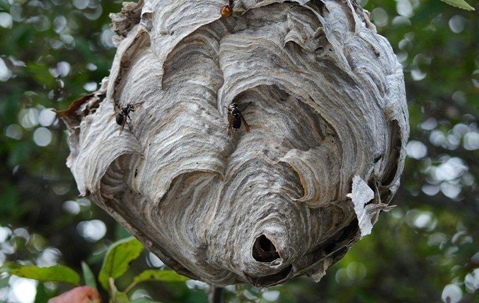Wasps are endemic throughout the continental United States, and New Haven is no exception. Because of our comparatively longer and harsher winters, wasps’ activity season is shorter than it is throughout much of the rest of the country, but they more than makeup for it during the warm months. While wasps do have their place in the ecosystem, they don’t have a place in your house. They sting, they swarm, and they can get downright testy when anything approaches their nests. Thus, you’re going to want to keep them away from your property. Let’s talk about how.
Wasp Distinguishing Features
Wasps often look like other stinging insects such as bees and certain types of flies. So how can you tell the difference? There are three main things you want to look for when trying to figure out if the bug infesting your home is a wasp.
- Body Shape: Wasps tend to be more svelte than bees. They’re long and narrow, and they have a defined, tightly cinched waist. Bees, meanwhile, are shorter and fatter, and they don’t have a defined middle.
- Body Hair: Unlike bees, which are fuzzy over most or all of their bodies, wasps are hairless and shiny. Some wasp varieties even have a metallic sheen to their exoskeletons.
- Stinger: Bees have stingers that detach from their bodies after use, and wasps don’t. This is tough to tell with the naked eye, but if you actually wind up stung, look at the sting. If you find a stinger still pumping away embedded in your skin, it came from a bee. If there’s no stinger, you likely got stung by a wasp.
Wasp Environmental Benefits
Wasps do a couple of important things for the ecosystems they inhabit. For one thing, many wasps are attracted to sweets, including nectar. This means they’re important pollinators, just like bees are. In fact, some species of plants – like the fig – would go extinct without their symbiotic relationships with wasps.
Wasps are also important predators of many pests. A few species of wasps eat insects, but most of them use these prey items to feed their young. Many wasp species actually lay their eggs inside or underneath prey items so their hatchlings have plenty of protein once they’re born. This means a healthy wasp population can reduce other pests like locusts, spiders, etc.
Wasp Prevention Methods
Even if they are good for the environment, that doesn’t mean you want a houseful of wasps. The good news is there’s plenty you can do to keep that from happening:
- Keep outdoor garbage covered to avoid attracting less picky wasp species.
- Fill holes in your yard to discourage ground wasp activity.
- Avoid planting flowers that attract wasps like blue, purple, white, or yellow flowers or flowers that bloom in the morning.
- Don’t let any fruits or veggies from your garden rot on the ground – harvest them before they fall.
- Avoid leaving sugary drinks or sweet foods sitting out.
- Get rid of other possible attractants like hummingbird feeders.
- Keep doors and windows shut or ensure screens fit well and don’t have tears or holes.
- Place wasp-deterring plants around your home, including: Marigolds-Mint-Basil-Geranium-Wormwood
If even these measures don’t prevent wasps, you do have other options. Here at Connecticut Pest Elimination, LLC we’ve been offering quality pest control services to Connecticut residents and business owners for almost thirty years. We’ve got the know-how and the tools to safely remove wasps from your property and ensure they’re gone for good. So visit our contact page or call us at (860) 544-5475 to schedule your service today.

